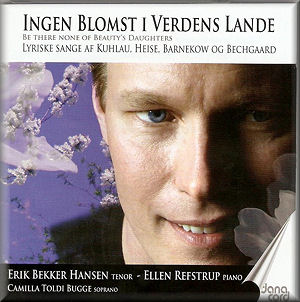 |
 |
|


alternatively
CD: AmazonUK
AmazonUS(download)
Sound
Samples & Downloads |
Ingen Blomst I Verdens Lande
Peter A. HEISE (1830-1879)
Digte fra det Engelske (1876)
Pilen og sangen (Longfellow) [2:02]
Vandrerne (Shelley) [1:47]
Ingen Blomst i Verdens Lande (Byron) [2:30]
Ekko (Moore) [1:55]
Bryd! bryd! bryd! (Tennyson) [2:16]
Vaage maa jeg, ak! (Robert Burns) [2:35]
Friedrich KUHLAU (1786-1832)
Rastlose Liebe [3:08]
Drey Gedichte aus Gerstenbergs poetischen Wäldchen, op. 21
Der erste Mai [2:22]
Der Traum [3:54]
Orpheus [7:40]
Christian BARNEKOW (1837-1913)
Fire folkesange efter det russiske ved Thor Lange, op. 14
Hørt jeg har [3:18] ¹
Skin du frem[3:19] ¹
Ak, paa Gjærdet Pilen tætte Knopper sætter [4:50] ¹
Fjernt paa Marken staar den slanke Hvidbirk [2:52] ¹
Julius BECHGAARD (1843-1917)
Lyriske Sange: Digte af Ernst v. d. Recke, op. 19
Tidt, naar jeg sidder ene paa mit Kammer [2:46]
Mig tyktes, du stod ved mit Leje [2:46]
Duggen er falden [2:52]
Hun er saa let som Skovens fejre Hind [1:53]
Hun sover i Ly af den blomstrende Lind [2:00]
Hvorhen i Verden jeg gaar min Sti [4:12]
Blomst underskjøn; Der voxer en Blomst [5:04]
 Erik Bekker Hansen (tenor)
Erik Bekker Hansen (tenor)
Camilla Toldi Bugge (soprano)
Ellen Refstrup (piano)
rec. February-June 2010. Kammermusiksalen, Musikhuset, Aarhus
Texts and translations included
 DANACORD DACOCD 705 [66:02]
DANACORD DACOCD 705 [66:02] 
|
|
|
The English translation of the disc’s title runs ‘Be there none
of beauty’s daughters’ and represents a poetic sensibility reflected
in these nineteenth century Danish romances. The texts set come
from a variety of sources, among which the settings of English
poetry will be perhaps the most surprising, and the ethos throughout
is that of post-Schubertian lied and ballad.
It would actually make a good musical quiz question; which composer
set Longfellow, Shelley, Byron, Tennyson, Burns and George Moore
in his 1876 collection? Doubtless one would wander around thinking
of the usual suspects – Sullivan, Parry, or some other worthy.
The answer is, in fact, Peter Arnold Heise, who studied in Leipzig,
and was acutely interested in settings of English poets, albeit
translated into Norwegian. The sensibility gravitates to Schumann
at points, though the Byron setting – the one that lends its
name to the disc’s title – leans more to Schubert. The little
‘catch’ in the piano part suits the Thomas Moore poem nicely,
vesting it an approving ballad air, though the most dramatic
is Tennyson’s ‘Break, break, break’ which draws from Heise an
almost operatic scena-like intensity. The concluding setting
is of Burns’s, ‘Summer’s a pleasant time’.
Kuhlau is probably best known for his inventive and congenial
piano scores, but he wrote well for the voice. His ebullient
setting of Goethe’s Rastlose Liebe is a winner, and one
can always enjoy the poised, often pert piano writing in such
as Der erste Mai from his Op.21 set which conflates Mozart
and Schubert adeptly as dual influences. The single longest
setting is of Orpheus, which reminds me somewhat of the
ballad settings of Loewe.
Christian Barnekow (1837-1913) was an organist and composer,
and also an able administrator. His Op.14 set of four songs
occupy firmly the lighter ballad style, but Julius Bechgaard,
a near contemporary, offers at once more ambitious and also
over-extended settings. The seven songs that make up his Op.19
collections of lyrical songs are nicely varied, but sometimes
simply too long for the material, the last being a particular
case in point.
The bulk of the performances are taken by the light-toned, mellifluous
tenor Erik Bekker Hansen ably accompanied by Ellen Refstrup.
Soprano Camilla Toldi Bugge takes the Rastlose Liebe
setting and duets with Hansen on the Barnekow settings. She
sounds to have been caught on an off day.
Jonathan Woolf
|
|




 All Nimbus reviews
All Nimbus reviews








